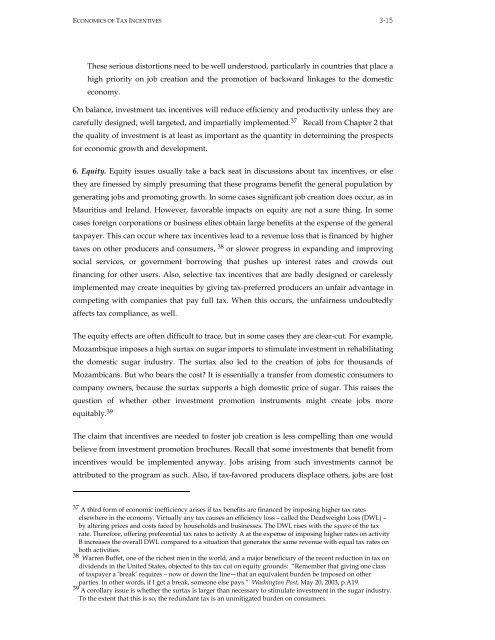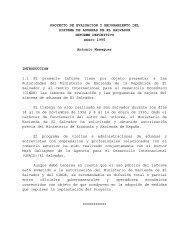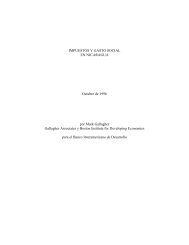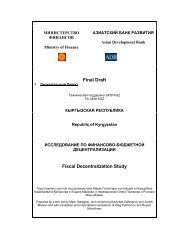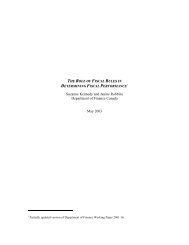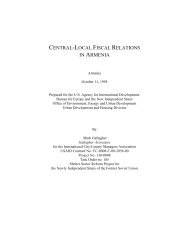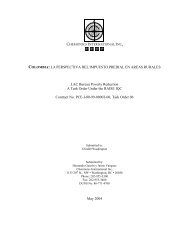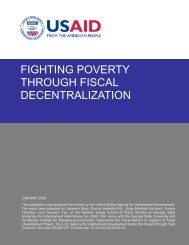Effectiveness and Economic Impact of Tax Incentives in the SADC ...
Effectiveness and Economic Impact of Tax Incentives in the SADC ...
Effectiveness and Economic Impact of Tax Incentives in the SADC ...
You also want an ePaper? Increase the reach of your titles
YUMPU automatically turns print PDFs into web optimized ePapers that Google loves.
ECONOMICS OF TAX INCENTIVES 3-15<br />
These serious distortions need to be well understood, particularly <strong>in</strong> countries that place a<br />
high priority on job creation <strong>and</strong> <strong>the</strong> promotion <strong>of</strong> backward l<strong>in</strong>kages to <strong>the</strong> domestic<br />
economy.<br />
On balance, <strong>in</strong>vestment tax <strong>in</strong>centives will reduce efficiency <strong>and</strong> productivity unless <strong>the</strong>y are<br />
carefully designed, well targeted, <strong>and</strong> impartially implemented. 37 Recall from Chapter 2 that<br />
<strong>the</strong> quality <strong>of</strong> <strong>in</strong>vestment is at least as important as <strong>the</strong> quantity <strong>in</strong> determ<strong>in</strong><strong>in</strong>g <strong>the</strong> prospects<br />
for economic growth <strong>and</strong> development.<br />
6. Equity. Equity issues usually take a back seat <strong>in</strong> discussions about tax <strong>in</strong>centives, or else<br />
<strong>the</strong>y are f<strong>in</strong>essed by simply presum<strong>in</strong>g that <strong>the</strong>se programs benefit <strong>the</strong> general population by<br />
generat<strong>in</strong>g jobs <strong>and</strong> promot<strong>in</strong>g growth. In some cases significant job creation does occur, as <strong>in</strong><br />
Mauritius <strong>and</strong> Irel<strong>and</strong>. However, favorable impacts on equity are not a sure th<strong>in</strong>g. In some<br />
cases foreign corporations or bus<strong>in</strong>ess elites obta<strong>in</strong> large benefits at <strong>the</strong> expense <strong>of</strong> <strong>the</strong> general<br />
taxpayer. This can occur where tax <strong>in</strong>centives lead to a revenue loss that is f<strong>in</strong>anced by higher<br />
taxes on o<strong>the</strong>r producers <strong>and</strong> consumers, 38 or slower progress <strong>in</strong> exp<strong>and</strong><strong>in</strong>g <strong>and</strong> improv<strong>in</strong>g<br />
social services, or government borrow<strong>in</strong>g that pushes up <strong>in</strong>terest rates <strong>and</strong> crowds out<br />
f<strong>in</strong>anc<strong>in</strong>g for o<strong>the</strong>r users. Also, selective tax <strong>in</strong>centives that are badly designed or carelessly<br />
implemented may create <strong>in</strong>equities by giv<strong>in</strong>g tax-preferred producers an unfair advantage <strong>in</strong><br />
compet<strong>in</strong>g with companies that pay full tax. When this occurs, <strong>the</strong> unfairness undoubtedly<br />
affects tax compliance, as well.<br />
The equity effects are <strong>of</strong>ten difficult to trace, but <strong>in</strong> some cases <strong>the</strong>y are clear-cut. For example,<br />
Mozambique imposes a high surtax on sugar imports to stimulate <strong>in</strong>vestment <strong>in</strong> rehabilitat<strong>in</strong>g<br />
<strong>the</strong> domestic sugar <strong>in</strong>dustry. The surtax also led to <strong>the</strong> creation <strong>of</strong> jobs for thous<strong>and</strong>s <strong>of</strong><br />
Mozambicans. But who bears <strong>the</strong> cost? It is essentially a transfer from domestic consumers to<br />
company owners, because <strong>the</strong> surtax supports a high domestic price <strong>of</strong> sugar. This raises <strong>the</strong><br />
question <strong>of</strong> whe<strong>the</strong>r o<strong>the</strong>r <strong>in</strong>vestment promotion <strong>in</strong>struments might create jobs more<br />
equitably. 39<br />
The claim that <strong>in</strong>centives are needed to foster job creation is less compell<strong>in</strong>g than one would<br />
believe from <strong>in</strong>vestment promotion brochures. Recall that some <strong>in</strong>vestments that benefit from<br />
<strong>in</strong>centives would be implemented anyway. Jobs aris<strong>in</strong>g from such <strong>in</strong>vestments cannot be<br />
attributed to <strong>the</strong> program as such. Also, if tax-favored producers displace o<strong>the</strong>rs, jobs are lost<br />
37 A third form <strong>of</strong> economic <strong>in</strong>efficiency arises if tax benefits are f<strong>in</strong>anced by impos<strong>in</strong>g higher tax rates<br />
elsewhere <strong>in</strong> <strong>the</strong> economy. Virtually any tax causes an efficiency loss – called <strong>the</strong> Deadweight Loss (DWL) –<br />
by alter<strong>in</strong>g prices <strong>and</strong> costs faced by households <strong>and</strong> bus<strong>in</strong>esses. The DWL rises with <strong>the</strong> square <strong>of</strong> <strong>the</strong> tax<br />
rate. Therefore, <strong>of</strong>fer<strong>in</strong>g preferential tax rates to activity A at <strong>the</strong> expense <strong>of</strong> impos<strong>in</strong>g higher rates on activity<br />
B <strong>in</strong>creases <strong>the</strong> overall DWL compared to a situation that generates <strong>the</strong> same revenue with equal tax rates on<br />
both activities.<br />
38 Warren Buffet, one <strong>of</strong> <strong>the</strong> richest men <strong>in</strong> <strong>the</strong> world, <strong>and</strong> a major beneficiary <strong>of</strong> <strong>the</strong> recent reduction <strong>in</strong> tax on<br />
dividends <strong>in</strong> <strong>the</strong> United States, objected to this tax cut on equity grounds: “Remember that giv<strong>in</strong>g one class<br />
<strong>of</strong> taxpayer a ‘break’ requires – now or down <strong>the</strong> l<strong>in</strong>e—that an equivalent burden be imposed on o<strong>the</strong>r<br />
parties. In o<strong>the</strong>r words, if I get a break, someone else pays.” Wash<strong>in</strong>gton Post, May 20, 2003, p.A19.<br />
39 A corollary issue is whe<strong>the</strong>r <strong>the</strong> surtax is larger than necessary to stimulate <strong>in</strong>vestment <strong>in</strong> <strong>the</strong> sugar <strong>in</strong>dustry.<br />
To <strong>the</strong> extent that this is so, <strong>the</strong> redundant tax is an unmitigated burden on consumers.


